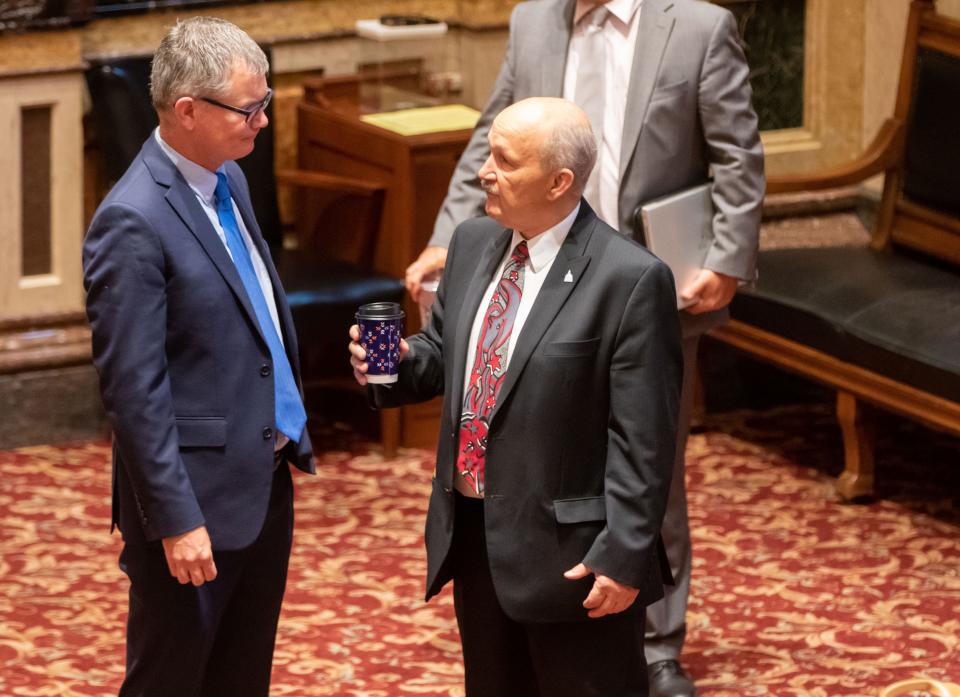Iowa lawmakers pass AEA bill, move to increase teacher pay, handing win to Gov. Reynolds
Iowa Republican lawmakers have reached a final deal to restructure funding to Iowa's Area Education Agencies, raise teacher pay and set school funding levels for the coming year, sending the wide-ranging bill to Gov. Kim Reynolds.
The final agreement on House File 2612 comes after months of negotiations between the House, Senate and governor. Reynolds first announced a plan to overhaul the AEAs during her Condition of the State address in January, but her initial bill met with widespread criticism, including from GOP lawmakers, causing House and Senate Republicans to write their own versions.
The AEAs — currently the sole provider of special education services — would continue receiving 90% of the state funding that they currently receive, while school districts would control the remaining 10%.
The legislation will give school districts control over all the state money for media and general education services that now goes to the AEAs, allowing them to spend the funding on private vendors or continue working with the AEAs under a "fee for service" model.
More: See how your Iowa lawmakers voted on the bill overhauling AEAs, raising teacher pay
Minimum pay for beginning teachers will increase to $50,000 per year, up from $33,500, under the bill, which also includes new state money for schools to raise experienced teachers' salaries and increase pay for nonsalaried school staff.
"This bill in its entirety will not only improve student achievement in special education, it will not only help improve the AEA system, which is a support system for special ed and general education, but it’s going to raise student achievement in its entirety in our state," said the bill's floor manager, Sen. Lynn Evans, R-Aurelia.
Democrats, the AEAs and other education groups oppose the changes. They say redirecting money that goes to the AEAs will make it difficult for the agencies to plan their budgets and could result in reductions in services and staff.
"Gov. Reynolds and the Republican majority in the legislature are breaking our AEAs," Sen. Molly Donahue, D-Cedar Rapids, said in a statement. "Their changes turn AEAs into an unstable fee-for-service program that reduces access in rural Iowa and consolidates power in Des Moines."

The bill passed the Senate on a 30-18 vote, with three Republicans, Sens. Waylon Brown, R-Osage; Mike Klimesh, R-Spillville; and Charlie McClintock, R-Alburnett, joining every Democrat in opposition. The House passed the bill on March 21.
Reynolds released a statement following the vote saying she looks forward to implementing the bill and thanking school administrators, school board members and teachers for their input.
"Over the last several weeks, this bill has been the focus of much discussion and debate," she said. "Change is seldom easy, but it is necessary to achieve better results. Reforming the AEA system creates accountability, transparency, consistency, and most importantly, better outcomes for all Iowa’s students."

How would AEA funding change under the bill?
The legislation makes several changes to how the AEAs are funded and whether school districts must continue using the agencies for certain services.
The AEAs are currently funded through a combination of state, federal and local property tax dollars. They offer special education services to school districts as well as media services and general education services.
The bill does not make any changes to funding for special education in the 2024-25 school year. In the 2025-26 school year and beyond, districts would receive the state special education funding that currently goes to the AEAs, but they would be required to send 90% of that money to the AEAs, while keeping the remaining 10% of funds.
The AEAs currently receive about $185 million in special education funding from the state, according to an analysis of the bill by the nonpartisan Legislative Services Agency.
Federal special education funding would continue to go to the AEAs.
In the 2024-25 school year, school districts would receive 60% of the state funding for media services and general education services and AEAs would receive 40%. Schools could choose whether to continue contracting with the AEAs for those services under a "fee for service" model, or use a private provider.
Beginning the following year, school districts would receive all the state funding for media and general education services and could choose whether to use the AEAs.
The AEAs currently receive about $35.7 million for general education services and $32.3 million for media services, according to the bill analysis.
The bill would authorize the Department of Education to create a Division of Special Education with 13 new staff members in Des Moines and another 40 who would be based within AEAs around the state.
The bill also creates a task force to study and make recommendations on the AEA system.
Pay for AEA administrators would not be allowed to exceed 125% of the average salary of the superintendents within their AEA region.
A Des Moines Register/Mediacom Iowa Poll conducted in late February found a majority of Iowans (56%) have a favorable view of the AEAs, while 24% view them unfavorably and 20% are not sure.
How does the bill increase pay for teachers, paraeducators?
The legislation would raise minimum pay for beginning teachers to $47,500 in the coming school year and to $50,000 the next year, up from $33,500 under current law.
It sets a minimum salary of $60,000 for teachers with at least 12 years of experience in the coming school year, before raising that minimum to $62,000 the next year.
And the bill has $22 million for schools to use to raise experienced teacher pay and another $14 million to increase pay for non-salaried school staff, like paraeducators.
The bill would also increase state per-pupil aid to schools by 2.5%, an increase of $191 per pupil, bringing total state funding for public K-12 schools $3.8 billion. The state is also expected to spend $179.2 million in the upcoming year on private school education savings accounts.
The Iowa Poll found 76% of Iowans favor raising minimum teacher pay to $50,000 per year, while 22% oppose an increase and 2% are not sure.
AEA overhaul draws bipartisan opposition, criticism
McClintock was the lone Republican to speak against the AEA proposal on the Senate floor.
He said he doesn't think Reynolds was wrong to call for a review of the AEAs, but said he believes the agencies would have been capable and willing to review themselves and make improvements without the need for the legislation.
"When this bill passes and the governor signs it, which she will do, our only reward will be the disappointment and anxiety of many AEA employees, teachers, parents and students," he said.
Sen. Sarah Trone Garriott, D-West Des Moines, said Republicans were "desperate attempt to pass something, anything, as soon as possible to please the governor. This isn’t about what Iowans want. This has not been about what Iowans need. The purpose was never about making Iowa education better and everyone in here and everyone out there knows it."
Sen. Cherielynn Westrich, R-Ottumwa, praised the bill, saying she thinks it will create more oversight and transparency in the AEA system.
"I think this is going to be great, and I’m in support of this bill," she said.
AEA chief: 'It's going to be bumpy for a few years'
Cindy Yelick, chief administrator of the Heartland AEA in central Iowa, told reporters following the Senate vote that "it's going to be bumpy for a few years" as the AEAs adjust to the changes in the bill.
"I can’t really tell you what it’s going to look like long term," she said. "The timeline is short. The changes are significant. And, as always, the AEAs will be focused on doing their very best to deliver supports and services to children and families and students and teachers and schools."
Yelick said the debate over the bill has already caused AEA employees to leave their jobs.
"We have AEAs that have already experienced almost a 10% reduction in staff because of staff leaving," she said. "We know that we are not in a prime position right now to replace those staff, just with the uncertainty of our future and what services will look like."
Campaign attacks begin over lawmakers' votes on AEAs, teacher pay
Lawmakers' vote on the bill is sure to be a central issue in several contested legislative races this fall, and both political parties wasted little time in criticizing their opponents' positions.
Republican Party of Iowa Chair Jeff Kaufmann quickly issued a statement slamming Democrats for voting against the teacher pay increase and saying "they should be held accountable."
"Today's vote demonstrates that Senate Democrats prioritize education unions over teachers," Kaufmann said. "Despite the opportunity to raise starting teacher pay, they voted against it."
It was an attack that Democrats saw coming. Sen. Bill Dotzler, D-Waterloo, criticized Republicans for putting several different proposals into the same bill, rather than voting on teacher pay separately.
"The next election we’ll be able to say you voted against teacher salaries on House File 2612 and you won’t be telling a lie," he said. "Because I’m going to vote against the whole bill, even though I support teacher salaries. That’s what’s wrong with doing this kind of thing."

Iowa Democratic Party Chair Rita Hart issued a statement saying Republicans "will stop at nothing to score political points."
"By voting to weaken Iowa’s Area Education Agencies, Republicans have put their personal political agendas and their need to appease Governor Reynolds above the Iowans they represent," Hart said. "It’s time to vote for Democrats so we can create balance in the legislature, end these partisan political power plays and make sure Iowans' voices are heard."
Mike Beranek, president of the Iowa State Education Association, accused Republicans in a statement of "dismantling" the AEAs and "chronic underfunding" of public schools, which he said was made worse by the "school choice" legislation Reynolds signed into law last year.
"Do not be fooled by their claims of support," he said. "Iowans are tired of empty promises and will remember this momentous mistake at the ballot box this fall."
Stephen Gruber-Miller covers the Iowa Statehouse and politics for the Register. He can be reached by email at [email protected] or by phone at 515-284-8169. Follow him on Twitter at @sgrubermiller.
This article originally appeared on Des Moines Register: Iowa Senate passes final AEA, teacher pay bill, sending it to Reynolds
Solve the daily Crossword

